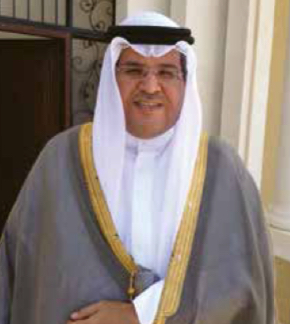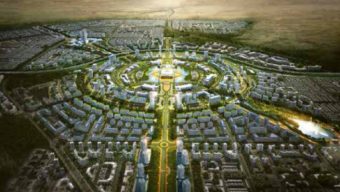
The state of Kuwait, the monarchy nestled on the coast of the Persian Gulf, which borders Iraq and Saudi Arabia, with a population of about 4.5 million, got its name after the Arabic term for a fortress built by the water. The largest industry in this Arab country is oil, which accounts for almost half of the country’s GDP. In Kuwait, summers last from April to October, with temperatures above 51 degrees Celsius. Kuwait attaches great importance to investments in environmental protection and implementing plans and measures that mitigate the negative consequences of climate change and allocates significant funds for investments.
We spoke with His Excellency Fayez Mujbel Sulaiman Al-Mutairi, Ambassador of Kuwait to Serbia, about the country’s national plan for adapting to the negative consequences of climate change, investments in desalination in the struggle for drinking water, reducing dependence on oil, plans to reach zero gas emissions, cooperation with our country and other topics.
Q: What are the biggest environmental challenges in the fight against climate change that the state of Kuwait is facing?
A: Our planet is facing the greatest environmental challenges in its history. The leaders of Kuwait took this into account when they drafted the national plan for the country’s development covering the period until 2035 – ‘The New Vision of Kuwait’.
This plan defines seven long-term development pillars – a sustainable environment, a diversified, sustainable economy, quality health care, efficient state administration, creative human capital, developed infrastructure and a prominent international position. Each of these postulates contains programmes and projects that are strategically important and envisaged to achieve the best possible results in implementing the New Vision of Kuwait, as well as the UN Sustainable Development Goals, which Kuwait officially adopted in 2015.
The greatest common challenge related to progress postulates is accomplishing and preserving sustainable development, which is impossible without investments in environmental protection, and this is a topic we attach great importance to, especially bearing in mind that our country is not spared the environmental challenges that the whole world is also facing. We can say that Kuwait is even more affected by them due to its geographical position because of which it suffers from a shortage of drinking water and extremely high temperatures, in addition to the risk due to the loss of biodiversity, the expansion of the desert and the rise of the sea level, as a result of climate change.
According to certain indicators, in the coming decades, the area of Kuwait could decrease from 1.4 to 3 per cent. Bearing in mind these data, we have drafted a national plan for adapting to the negative consequences of climate change, which defines the main challenges, such as reducing our economy’s dependence, especially the transport, energy and water supply sectors, on fossil fuels, i.e. the diversification of the economy, to reduce dependency from oil and gas, while at the same time, preserving the living standard and the quality of life and ensuring the continuation of socio-economic development by creating an environment conducive to foreign direct investments and creating more jobs. We must bear in mind that Kuwait is one of the developing countries with only one basic source of income – oil.
IN FOCUS:
- NOVI SAD STEPS INTO THE WORLD OF ELECTROMOBILITY
- THE PATH TO THE DEVELOPMENT OF E-MOBILITY
- ENERGY REHABILITATION CONTRIBUTES TO ENERGY SAVING AND ENVIRONMENTAL PROTECTION
Q: The impact of oil on environmental pollution is well documented. How much do you do to raise the environmental awareness of companies and citizens alike? Which institutions regulate the field of environmental protection?

A: Raising awareness about environmental protection plays a significant role in implementing the measures foreseen by the development plan, as well as national legislation and international agreements, all to have better environmental protection and fight against climate change. The Public Environment Office (Directorate for Public Relations and Environmental Awareness) is a state institution in Kuwait responsible for instilling awareness in individuals, regardless of gender and age, about the connection between a clean environment and public health and security. The effort to disseminate good practices related to environmental protection among children is also significant because they are the future. In this sense, numerous campaigns for raising environmental awareness and bolstering environmental protection were carried out by the Public Office at all levels and among different social groups. One of those campaigns aimed to familiarize the public with the Environmental Protection Law, as well as raise awareness about this problem among our citizens and foreign ones. Numerous activities were carried out in the media, shopping centers, on social media and at exhibitions and conferences.
Q: You also suffered significant damage from the burning of numerous oil fields during the Gulf War. How much and what did you invest in air purification and ecosystem protection systems after that?
A: The events you mentioned and the consequences of climate change that we felt on our skin helped Kuwait to understand how important it is to put the preservation of the environment, which includes quality air and the protection of the ecosystem, at the top of the priorities when developing, financing and implementing new projects in oil and energy industry, as well as in other industrial and development activities. Kuwait has conducted field research and established fixed stations that measure and monitor air pollution, mobile laboratories that can respond to emergencies and air quality monitoring stations near oil fields. Furthermore, our government has started implementing projects under the Clean Development Mechanism to reduce greenhouse gas emissions and train national technical teams to effectively detect and assess air pollutants and implement the required measures.
Interviewed by: Mirjana Vujadinović Tomevski
Read the story in the new issue of the Energy portal Magazine CIRCULAR ECONOMY.



